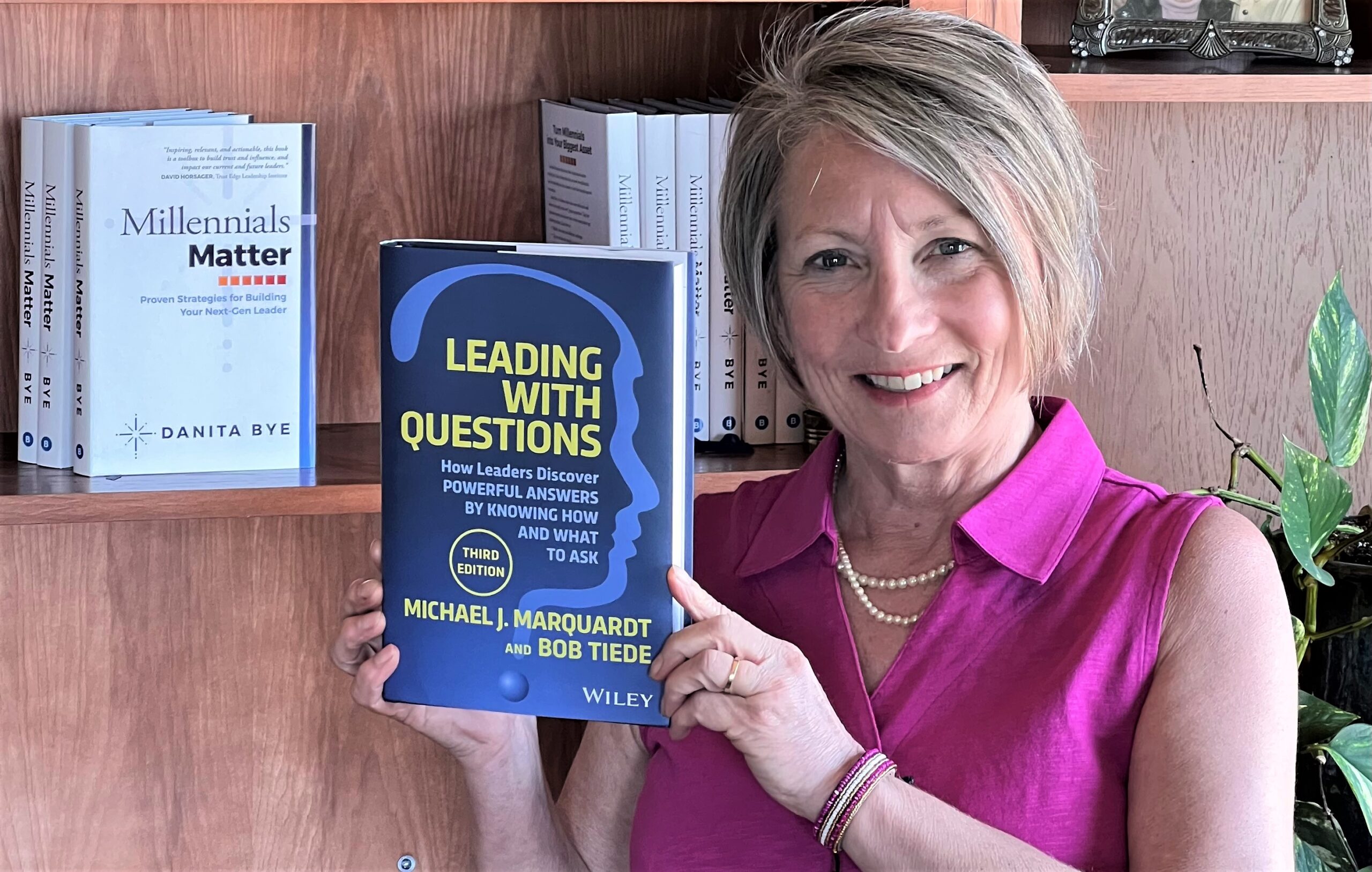
Leading With Questions is Part of an Effective Leadership Strategy
I serve on the Executive Coaching Cohort. Bob Tiede is our leadership development facilitator. He’s enthusiastically been promoting Leading With Questions: How Leaders Find Powerful Answers by Knowing How and What to Ask – Third Edition.
Amazon already has this valuable leadership resource ranked as their #1 New Release in the category of Business Communications.
Since we’ve been talking about Courageous Leadership, I’m drawn to this excerpt from Chapter 2: Benefits of a Listening Culture. It’s a reminder that one of the most courageous things that we can do as a leader is to ask insightful, strategic questions. We can increase our leadership effectiveness by 10x.
For example, in a recent conversation with Bob, he asked a series of three questions that shifted my entire perspective, and got me unstuck:
- What would be impossible to do, but if it happened, would be incredible?
- What would make it possible?
- What would I need to change in order to make it happen?

Chapter Two: “Benefits of a Questioning Culture”
We have all heard sayings like these:
Go along to get along.
Don’t rock the boat.
They’re not paying me enough to think.
If these and similar comments are commonplace around your organization, it is safe to say that your organization does not have a questioning culture. In organizations that discourage questions, information is usually hoarded, people keep their heads down and stick to their knitting, and few people are willing to take any risks. In answer-driven organizations, curiosity, risk-taking, challenging the status quo, and even the willingness to be wrong takes a back seat. (1) The prevailing culture of such organizations, either implicitly or explicitly, calls for rigidity, risk avoidance, protectiveness, defensiveness, and automatic routines and habits. These organizations usually suffer from low morale, poor teamwork, and poor leadership. They become fossilized, even moribund.
Questions also build a culture of accountability. They can foster commitment without barter and sustain the corporate community through civic engagement. Jack Welch, in his book Winning, states that leaders must be the ones who indeed ask the most and the best questions.
What Is a Questioning Culture?
When we ask questions of others and invite them to search for answers with us, we are not just sharing information, we are sharing responsibility. A questioning culture is a culture in which responsibility is shared. And when responsibility is shared, ideas are shared, problems are shared (problems are not yours or mine, but ours), and ownership of results is shared. When an organization develops a questioning culture, it also creates a culture of we, rather than a culture of you versus me, or management versus employees.
 A Questioning Culture Has Six Hallmarks
A Questioning Culture Has Six Hallmarks
When an organization has a questioning culture, the people in it:
-
- Are willing to admit, “I don’t know.”
- Go beyond allowing questions; they encourage questions.
- Are helped to develop the skills needed to ask questions in a positive way.
- Focus on asking empowering questions and avoid disempowering questionsEmphasize the process of asking questions and searching for answers rather than finding the “right” answers.
- Accept and reward risk-taking.
Organizational Benefits of a Questioning Culture
Questions serve as the foundation for increasing individual, team, and organizational learning. Every question can be a potential learning opportunity. As a matter of fact, deep and significant learning occurs only as a result of reflection, and reflection is not possible without a question—whether the question is from an external or internal source. A culture that encourages questions, therefore, is a culture that encourages learning. As Adams notes, “Question-driven cultures have the capacity to respond swiftly and effectively to problems inside the organization while staying ahead of the curve in planning for external challenges and opportunities.” Organizations that ask questions will be more dynamic, agile collaborative, and creative.
Learning depends upon curiosity and asking questions. The experience of curiosity is equivalent to continuously living and operating out of a question frame as simple as “What’s this?” as all children do. It is through questions that we operationalize curiosity into behavior, and as a result, they are the foundation of any kind of learning, be it formal, informal, or personal. Questions, especially challenging ones, cause us to think and learn.
Marilee Adams observes that the “smartest, most innovative and productive organizations, and the most talented leaders and managers, are successful not because they have quick answers but because they create inquiring cultures. Such environments are highly thoughtful and strategic, fostering the most innovations and breakthroughs in products, services, and even operations.” (8)
Vance Coffman, the former chairman, and CEO of Lockheed Martin, comments that he built a learning organization by asking questions. “Great questions are good fuel for fostering curiosity. Great questions guide my search for common sense explanations of a situation.” When asked, what critical questions should a new senior executive at Lockheed Martin ask, he replied: Why is this the way it is? Do we understand why we got there?”
Improved Decision Making and Problem-Solving
Organizations that encourage leaders at all levels to take the time to ask thoughtful and probing
Mark Harper of ConocoPhillips points to another benefit of a questioning culture. It helps create “a higher level of trust that dialogue and debate will occur before major decisions are made.” As a result, he says, people feel included in the process, and “there is more of a commitment to execution when changes have to be implemented.”
Greater Adaptability and Acceptance of Organizational Change
Change brings new ideas, new ways of doing things to the organization. Change and new ideas are often rejected in organizations without a questioning culture because they might conflict with existing, established mental models or ways of doing things, which have never been questioned. When questions are rare, those promoting new ideas have the task of confronting these existing assumptions without invoking defensiveness or anger. This is difficult to do in organizations where the prevailing culture discourages questions. Their questions, no matter how gently phrased, stand out and seem disruptive because questions are so rare. When an organization develops a questioning culture, however, questions cease to be unusual and cease to be threatening. This makes it easier for even difficult and challenging questions to be addressed—and for the organization to adapt to change.
Great questions cause the questioner to become more aware of the need for change, and to be more open and willing to change. The questions themselves may actually cause the leader to become a change catalyst. The leader who leads with questions will more likely champion new ideas heard and developed in the inquiry. New ideas and perspectives enable the leader to make strong arguments for advocating change.
Motivating and Empowering Employees
Good questions energize people. And a questioning culture can energize an entire organization. Margaret Wheatley notes how questions and the resulting reflection nourish people and develop internal motivation. Questions create conditions that foster openness and release energy. People are energized when they are questioned because they have been asked for their ideas.
Ken Blanchard remarks that too many leaders try to make people feel unimportant. The important thing about leadership is not what happens when you’re there but what happens when you are not there. Leaders who promote a questioning culture in their organizations move people from dependence to independence. Blanchard notes that great questions equip people so that positive things happen when you are not there. Questions create a supportive, creative environment. By asking questions, leaders help people discover for themselves what is important for them in doing what is necessary for the organization. This discovery process improves their self-confidence and self-esteem, empowering them in the process. Concurrently, they take ownership of the solution because they have participated in developing it.
Good questions empower people to devise their own solutions. When people discover their own answers, they develop self-responsibility and accept ownership of the results. Asking people questions shows them that you value them. Questions move people from dependence to independence.
Enhanced Innovation
Creativity requires asking questions for which an answer is not already known. The truth is that innovation is rarely the product of pure inspiration, that “Eureka!” moment when some genius comes up with a wholly new idea. Rather, innovation happens when people see things differently. It starts with a questioning culture that helps people gain a new perspective and see things differently. Innovation is generated by great questions in an environment that encourages questions.
Better Listening and Communication
Julie Giulioni told us that questions are wonderful to “create connections, contest, insights, understanding, and energy. If leaders could choose just one superpower, I would recommend cultivating the ability to ask great, meaty, engaging, thought-provoking questions.” Dina Dwyer-Owens, Brand Ambassador for Neighborly, emphasizes that when employees feel they are heard and that their opinions count for something, it will have a significant impact on things like employee retention, productivity, and customer satisfaction. These things have been shown to create an average gain in productivity of six percent. Employees are people, not commodities. When leaders listen first, they humble themselves as servants and people begin to feel like valued equals.
Stronger Commitment to Learning and Development
A recent Harvard University study found the simple act of asking questions is one of the most important aspects of trusted and open relationships, higher emotional intelligence, and learning. (23) Questions not only demonstrate a greater commitment to developing others, but they also make you more adept at cultivating others’ abilities as well as your own. Leaders who ask questions develop their emotional intelligence through questions. Questioning leaders thus improve their ability to teach, mentor, and coach.
Stronger Leadership
Jim Collins, in his best-selling classic, Good to Great, reports his discovery that leaders of great companies are both very humble and very persistent. (25) In his description of “Level 5 leaders,” he observes that the successful leaders of the companies he studied recognized that the title of leader does not make one a source of all wisdom. Great leaders are humbled by the realization of all they do not know. They know that asking questions of a few will not give enough data; to succeed they must make asking questions of anyone and everyone their top priority.
Looking Ahead
Ray Dalio, the founder of Bridgewater Associates, told us that “great questions are a much better indicator of future success than great answers.”
Questions for Reflection
- What is a questioning culture?
- What are the benefits of a questioning culture?
- How can I create a questioning culture?
- What are some strategies and actions I can take to build a culture in which questions are welcomed, assumptions are challenged, and new ways to solve problems are explored?
- How can I build trust, enthusiasm, and commitment through questions?
- What questions can I use to empower my colleagues and employees?
- How can I use questions to build greater self-awareness and self-confidence in myself and in others?
- What are some ways that I can demonstrate openness and flexibility with questions?
- How can I become a better communicator and listener through the use of questions?
- How can I more effectively handle conflicts with questions?
We are thrilled that the “3rd Edition of “Leading With Questions” is currently the #1 New Release in Business Communication on Amazon:
FYI – Bob’s Blog, LeadingWithQuestions.com just celebrated its 11 Year Anniversary and is followed by leaders in over 190 countries!
This article was featured in my 1st May Newsletter. Here’s a link to the newsletter – there are more articles and videos you may find useful. Danita Bye May 2023 Newsletter


 A Questioning Culture Has Six Hallmarks
A Questioning Culture Has Six Hallmarks
No Comments